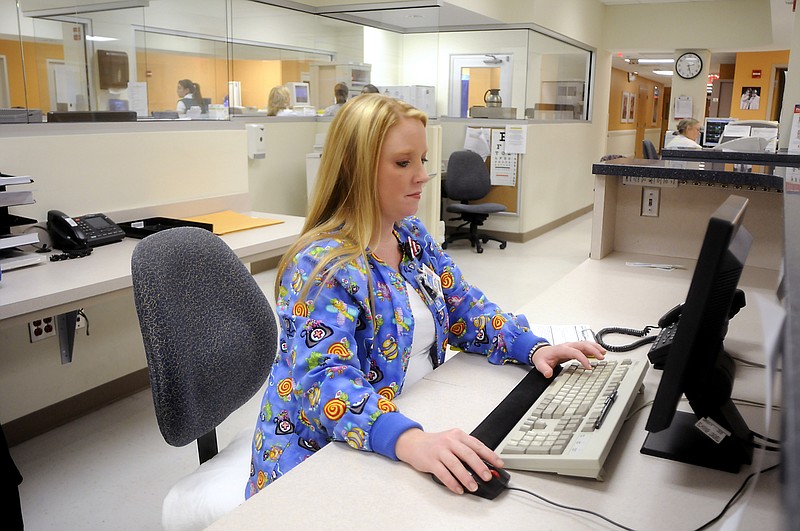North Georgia hospitals are "tremendously opposed" to a proposed tax on hospitals' net patient revenues, a fee that state officials say is the most palatable method to sustain the state's struggling Medicaid program.
"This proposal will put many hospitals in the state in severe financial jeopardy," said Doug Volinski, chief financial officer at Hutcheson Medical Center in Fort Oglethorpe.
Based on state estimates, Hutcheson stands to lose more than $937,000 and Hamilton Medical Center in Dalton, Ga., would lose $1.7 million if the tax passes as part of the fiscal year 2011 budget.
"This type of 'sick tax' will only exacerbate the ever-increasing shortfall in funding to provide critical medical services to the community we serve," Hamilton Chief Financial Officer Gary Howard wrote in an e-mailed statement.
During a recent state budget hearing in Atlanta, state officials said Georgia's Medicaid program has a deficit of about $500 million. The proposed 1.6 percent tax on hospitals and Medicaid managed-care companies could raise $345 million in state funds -- $247 million from hospitals alone. The money would be funneled back into Medicaid and draw down almost $1 billion in federal matching funds, forestalling a potentially devastating reimbursement rate cut.
The bill originally was submitted during the 2009 legislative session, but was shelved. It has come up again as a proposal in Gov. Sonny Perdue's budget, but still must be passed by the Legislature.
State officials said 29 hospitals that serve a large proportion of Medicaid patients will see a net gain if the proposal passes. For instance, the Office of Planning and Budget estimated that Grady Memorial Hospital in Atlanta would gain $12 million.
But 39 more hospitals only would break even and 120 would lose revenue, according to the budget office.
Still, government officials said the only alternative to the tax is a 16.5 percent across-the-board cut to Medicaid reimbursement rates for all providers.
PDF: Hospital BedIMPACT ON HOSPITALSA proposed 1.6 percent tax on net patient revenues is projected to bring in $274 million from hospitals in additional state revenues, plus $97 million from Medicaid managed care companies. The impact for specific hospitals is estimated as follows:* Hutcheson Medical Center in Fort Oglethorpe: Loss of $937,365* Hamilton Medical Center in Dalton: Loss of $1.7 million* Grady Memorial Hospital in Atlanta: Gain of $12,511,482* Emory University Hospital in Atlanta: Loss of $9.8 million* Gordon Hospital in Calhoun: Loss of $430,126Source: Governor's Office on Planning and Budget
The effects of such a cut would be far worse than the tax, they said. Hutcheson would lose $2.2 million, said Bert Brantley, spokesman for Gov. Sonny Perdue's office.
"We need a stable funding source for the Medicaid program," he said. "Either we do this provider fee, and we collect these funds and match them with federal money ... or we do this rate cut, which is going to have a devastating effect."
Hospitals also argue that the proposed tax sets them on a "slippery slope" that could lead to future, unmanageable increases.
"We fundamentally oppose the idea of the state government singling out one industry for a tax, which is exactly what's going on," said Kevin Bloye, spokesman for the Georgia Hospital Association.
ALTERNATIVE TO BED TAX
Mr. Bloye suggested raising the tobacco tax to shore up the state's Medicaid program. Georgia has the fifth-lowest tobacco tax in the nation, he said.
A tobacco tax boost may be necessary even with the hospital tax to solve the state's budget crisis, said Tim Sweeney, senior health care policy analyst with the Georgia Budget and Policy Institute.
Mr. Sweeney said the institute's support for the bed tax is "less about being in favor of the policy of this specific tax so much as (acknowledging that) the Medicaid budget in Georgia needs additional revenue."
"I think we're happy to see the governor have a balanced approach ... instead of just continuing to cut programs," he said.
Mr. Bloye said federal stimulus money helped stave off a similar tax last year, but those dollars will dry up this year.
"I don't think there are a lot of legislators who are excited about this idea, but they're in a position where they see there's nowhere else to turn. They feel like their backs are against the wall," he said. "There are no winners in this whole state budget. We just happen to be one of the largest losers."
Sen. Don Thomas, R-Dalton, said he hasn't made up his mind about the proposed hospital tax, but he is concerned about the impact on the state's medical infrastructure.
"We've got to protect our hospitals," he said.
Even so, he said, "we're going to end up in a severe crisis with the budget, and we're going to have to look at cutting things and (looking) for every available dollar to tide us over until the economy gets better."
State Rep. Jay Neal, R-LaFayette, said he had some "major concerns" about the proposal, particularly its financial impact on Hutcheson.
"I don't like the ultimate impact it's going to have on our hospitals," he said.
Rep. Neal said he's interested to see how the proposal changes as it moves through the legislative process.
Rep. Martin Scott, R-Rossville, has clearly stated he's opposed to the bed tax.
"I've heard all I need to about it," he said. "I haven't heard anything that compels me to think we need a new tax."
